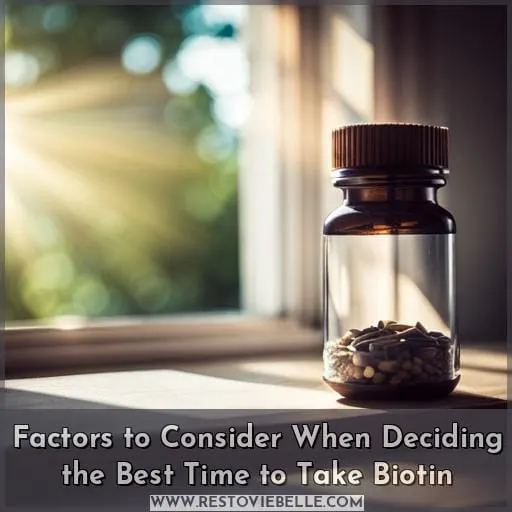This site is supported by our readers. We may earn a commission, at no cost to you, if you purchase through links.
 As the old adage goes, “timing is everything” – and this couldn’t be truer when it comes to taking biotin. When is the best time to take biotin? Knowing when you should supplement with this essential vitamin can make all the difference in terms of its absorption and effectiveness.
As the old adage goes, “timing is everything” – and this couldn’t be truer when it comes to taking biotin. When is the best time to take biotin? Knowing when you should supplement with this essential vitamin can make all the difference in terms of its absorption and effectiveness.
Biotin belongs to a group of vitamins called B-vitamins, also known as Vitamin H or B7, which play critical roles in energy metabolism and nervous system function by helping turn carbohydrates, fats, and proteins into usable energy for your body.
In this article, we’ll discuss what makes timing important when it comes to taking biotin; benefits associated with different times throughout the day; factors that affect how well your body absorbs biotin; tips on optimal absorption techniques; and finally provide personalized advice from healthcare professionals who are qualified experts in their field.
Table Of Contents
Key Takeaways
- Morning intake of biotin boosts energy and avoids interactions.
- Evening intake of biotin supports recovery, hormone regulation, and growth.
- Consistency in timing is key for steady benefits of biotin.
- Consultation with a healthcare professional is essential for personalized advice on biotin intake.
What is Biotin and Why is Timing Important?
You may need to supplement with biotin for metabolic, immune, and pregnancy support, but timing is key as it can affect the efficacy of your intake. Taking biotin in the morning offers benefits such as increased energy throughout the day.
Nighttime consumption can help reduce shedding and improve the hair growth cycle.
Meal timing helps with optimal absorption since taking it on an empty stomach could cause queasiness or nausea. Factors like age, health condition, and genetics also play a role in determining how much should be taken daily.
It’s important to consult an expert before starting any supplementation program for personalized advice regarding dosage recommendations based on individual needs and goals.
Absorption from supplements varies depending upon form; therefore, selecting one that best suits you is essential when considering the time of consumption along with other factors mentioned above for maximum effectiveness.
Benefits of Taking Biotin at Specific Times
Are you considering taking biotin for its many health benefits? If so, it may be important to consider when the best time is to take it. Different times of day, such as morning and evening, can affect how your body absorbs this vitamin, while also determining whether or not you should take it with food.
Morning Intake
Getting your biotin intake in the morning can help ensure you get adequate levels of this essential nutrient. Eating breakfast with a dietary supplement or incorporating it into your daily routine is recommended to maximize bioavailability factors and reap hair benefits.
Consuming vitamin H at the start of the day ensures that its effectiveness isn’t reduced by other vitamins, minerals, and foods consumed throughout the day. It’s important to consult a health professional before taking any supplement for guidance on dosage and timing for optimal results.
Morning consumption of biotin should be part of an overall balanced diet according to one’s age-specific recommendations from their healthcare provider if they’re looking to experience all its beneficial effects safely!
Evening Intake
At night, biotin helps your body to recover from the day’s stressors and assists with hormone regulation. It has evening benefits for nutrient-led hair growth, improving hair quality while you sleep. Sleep impact is also significant, promoting absorption rates and metabolic variations that occur in a circadian rhythm.
- Supports immune system functioning
- Aids in fatty acid metabolism
- Stimulates repair of damaged tissues. Supplementation timing matters; evening intake provides optimal results due to the body’s natural rhythms when it comes to managing biotin levels for healthful outcomes.
With or Without Food
Deciding whether to take biotin with or without food depends on personal preference and individual needs. Taking it in the morning may help regulate blood sugar levels, while an evening dosage can boost energy metabolism.
Meal timing should also be taken into consideration, as some foods can interfere with its absorption rate, so consulting a healthcare professional is recommended if taking dietary supplements. There are various forms of biotin available, including tablets, capsules, and liquids; however, missed doses shouldn’t be doubled up, and any questions regarding dosage should always be discussed with your doctor first for best results.
Factors to Consider When Deciding the Best Time to Take Biotin
Deciding the best time to take biotin is a personal preference, but consistency in timing and considering any other medications or supplements you might be taking is important factors. Factors such as these should be taken into account when determining the ideal intake of biotin for your needs.
Personal Preference
No matter your lifestyle, taking biotin at a time that fits your personal preference can ensure you get the most out of its benefits. Consider morning or evening consumption, food timing for optimal absorption, supplement interaction with other medications, and healthcare consultation to decide on the recommended dosage.
Mid-day consumption is also an option but may require more frequent dosing depending on hair growth goals and individual needs. Whatever choice is made regarding timing should be taken into consideration when determining the best dose, as well as any potential side effects from long-term supplementation.
Consistency in Timing
Consistency in timing is essential when taking biotin. Make sure to take it at the same time each day. Morning preference may benefit from supplement synergy, as other vitamins are typically taken around this time.
Bedtime choice can be beneficial for hair and skin health, while providing a consistent supply of nutrients throughout the night.
Mealtime benefits include increased absorption, but vitamin H must still be taken regularly to prevent biotin deficiency symptoms such as dry skin, rashes, thinning hair, and brittle nails.
Timing consistency ensures optimal nutrient delivery no matter your schedule or lifestyle changes, so you always have access to its many health benefits!
Other Medications or Supplements
It’s important to consider any other medications or supplements you may be taking when determining the optimal timing for your biotin intake. Awareness of potential interactions and combined intakes is key, as well as considering how compatible they are with each other in terms of timing.
Also, pay attention to potential conflicts between dietary supplements like biotin and prescribed medication that could lead to undesired side effects such as high cholesterol levels or changes in blood sugar regulation.
Knowing if there is synergy between different components can improve energy levels while avoiding complications from taking multiple substances together.
Tips for Optimal Biotin Absorption
When determining the optimal time to take biotin, it is important to consider a few key points. To ensure optimal absorption of this essential vitamin, one should always take biotin with a meal and avoid consuming it with certain foods or beverages.
Additionally, make sure to follow the recommended dosage as indicated by your healthcare provider.
Take Biotin With a Meal
For optimal absorption, consider taking biotin with a meal to help your body get the most out of it. Biotin bioavailability increases when taken with food as digestion aids its absorption. Nutrient metabolism and nutrient absorption improve, allowing for better utilization of B vitamins like biotin.
Mealtime benefits include improved hair thinning, nail health, and other metabolic processes related to fatty acids and amino acid production that can be hindered by deficiencies in biotin intake from food sources alone.
Additionally, interactions between foods can enhance or inhibit nutrient uptake, so being mindful of what is consumed alongside supplements helps optimize results from regular use over time.
Taking into consideration dietary needs along with supplementing appropriately provides an individualized plan for long-term health success driven by lifestyle choices rather than relying solely on pharmaceuticals or other costly intervention methods.
These methods often yield short-term improvements but lack sustainability without further effort beyond initial treatment protocols.
Avoid Taking Biotin With Certain Foods or Beverages
To get the most out of your biotin intake, avoid taking it with certain foods or beverages such as coffee and alcohol. Nutrient absorption interference can occur when taken alongside dairy products, calcium-fortified juices, or mineral supplements.
Biotin timing effects are also important. Pregnant women should ensure their dietary staple includes Vitamin B-7 for optimal fetal development and immune function. For hair volume benefits, space doses throughout the day instead of one large dose to prevent possible inhibiting food pairings from interfering with absorption rate.
An optimal supplementation approach is essential. Consult a doctor before introducing biotin into your diet to identify any potential interaction concerns that may arise with existing medications being taken simultaneously.
Follow the Recommended Dosage
Follow the dosage instructions on your biotin product label to ensure you’re getting the right amount of this essential vitamin for optimal absorption. Incorporating biotin into your morning routine may be best as it can help with energy metabolism and fatty acid synthesis.
Taking it at night can reduce hair shedding. Meal timing is important too – take biotin with food or amino acids to improve absorption factors. Talk to your doctor for specific recommendations tailored towards you and any potential long-term use of supplements.
Consult With a Healthcare Professional for Personalized Advice
It’s important to talk with a healthcare professional when considering taking biotin, as they can provide customized recommendations according to your individual needs. They can help you decide on the best timing for taking it and what dose might be appropriate for any conditions like genetic disorders or dermatitis that may require extra supplementation.
If you’re looking for positive skin changes or hair growth improvement, including both texture of hair and stimulation of new strands, consulting with a doctor is beneficial. This ensures that the dosage matches your specific needs in order to get the best possible results from using biotin supplements.
Healthcare guidance should always be sought before beginning any supplement regimen so that personalized scheduling and advice on timing can be established accordingly.
Conclusion
It’s clear that timing is everything when it comes to taking biotin. From the morning to the evening and with or without food, there are various benefits to taking biotin at different times.
To hit the nail on the head when deciding the best time to take biotin, it’s important to take into account personal preference, consistency in timing, and any other medications or supplements you may be taking.
To ensure optimal absorption, taking biotin with a meal is recommended, avoiding certain foods and beverages, and following the recommended dosage.
While the best time to take biotin may vary from person to person, consulting with a healthcare professional can help provide personalized advice to ensure you get the most out of your biotin intake.











